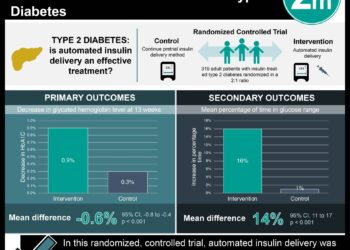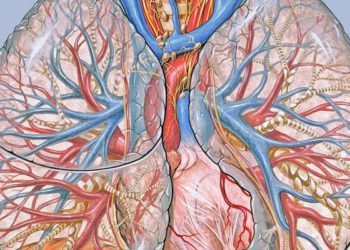Elevated plasma ACE2 associated with an increased risk of poor cardiovascular outcomes
1. Increased levels of circulating ACE2 were associated with greater risk of cardiovascular and non-cardiovascular death, heart failure, myocardial infarction, stroke, and diabetes.
2. Compared to other clinical risk factors such as diabetes, body-mass index, smoking status, non-HDL cholesterol, and systolic blood pressure, plasma ACE2 was the strongest predictor of overall death.
Evidence Rating Level: 2 (Good)
Study Rundown: Angiotensin-converting enzyme 2 (ACE2) is thought to facilitate the entry of SARS-CoV-2 into cells, leading to a poor prognosis among patients hospitalized with COVID-19. This prospective, case-cohort analysis examined the association between plasma ACE2 concentration and risk of death or cardiovascular disease outcomes among individuals in 27 low-, middle-, and high-income countries. From January 5, 2005, to December 31, 2006, 55 246 participants were enrolled into the Prospective Urban Rural Epidemiology (PURE) study, of which 10 753 participants qualified for assessment. Relevant cardiovascular disease outcomes included death, myocardial infarction, stroke, heart failure, and diabetes. Over a 9-year follow-up period, increased plasma ACE2 was associated with increased risk of total deaths, incident heart failure, myocardial infarction, stroke, and diabetes. This was true independent of age, sex, ancestry, and risk of cardiovascular event. In addition, ACE2 was found to be the strongest predictor of overall death when compared to other clinical risk factors such as smoking, diabetes, blood pressure, lipids, and body-mass index (BMI). This study was limited by a lack of distinction between genetic and environmental factors in influencing ACE2 levels among participants. Moreover, although heritability of plasma ACE2 was estimated to be between 33-66%, the authors only found a single variant on the ACE2 gene. Nevertheless, this study supports the largest epidemiological analysis of plasma ACE2 levels in a general population.
Click to read the study in The Lancet
Click to read an accompanying editorial in The Lancet
In-depth [prospective cohort]: The primary goal of this study was to determine the association between plasma ACE2 concentration and risk of total deaths (cardiovascular and non-cardiovascular), myocardial infarction, stroke, heart failure, and diabetes. Overall, 10 753 participants (4058 Latin, 3372 European, and 1269 Persian) were included in this study with a median follow-up of 9.42 years (IQR 8.74-10.48). Participants’ blood samples were collected in their country of origin and shipped to the Population Health Research Institute (Hamilton, ON, Canada) for further analysis using genotyping and immunoassay. Samples that were deemed unsuitable for analysis or those obtained without fasting were excluded from the study. Plasma ACE2 levels were higher in men than women (0.58 SD units, 95% CI 0.54-0.61); however, no significant difference was noted with respect to the effect of ACE2 on cardiovascular outcomes based on sex (males: hazard ratio [HR] 1.23, 95% CI 1.11-1.37 vs. females: 1.21, 95% CI 1.09-1.34). In addition, Plasma ACE2 levels were highest among East Asians and lowest in South Asians (difference among ancestral groups, 0.69 SD units, 95% CI 0.56-0.82). ACE2 was also associated with high BMI and risk of type 2 diabetes. Conversely, no significant association was noted between plasma ACE2 and increased LDL cholesterol, systolic blood pressure, or smoking status. In a subset of study participants with hypertension (n=5216), there was no association between plasma ACE2 concentration and use of ACE inhibitors, angiotensin receptor blockers, beta blockers, calcium channel blockers, or diuretics. Elevated plasma ACE2 was associated with a higher risk of overall death (HR 1.35, 95% CI 1.29-1.43), cardiovascular deaths (HR 1.40, 95% CI 1.27-1.54), non-cardiovascular deaths (HR 1.34, 95% CI 1.27-1.43), heart failure, myocardial infarction, stroke, and diabetes. Among participants who died due to a cardiovascular cause, plasma ACE2 was found to be the strongest risk factor (HR 1.52, 95% CI 1.38-1.68), followed by systolic blood pressure (HR 1.32, 95% CI 1.22-1.43). Findings from this study suggest that elevated plasma ACE2 is associated with a greater risk of death (overall, cardiovascular, and non-cardiovascular), stroke, myocardial infarction, diabetes, and heart failure.
Image: PD
©2020 2 Minute Medicine, Inc. All rights reserved. No works may be reproduced without expressed written consent from 2 Minute Medicine, Inc. Inquire about licensing here. No article should be construed as medical advice and is not intended as such by the authors or by 2 Minute Medicine, Inc.







